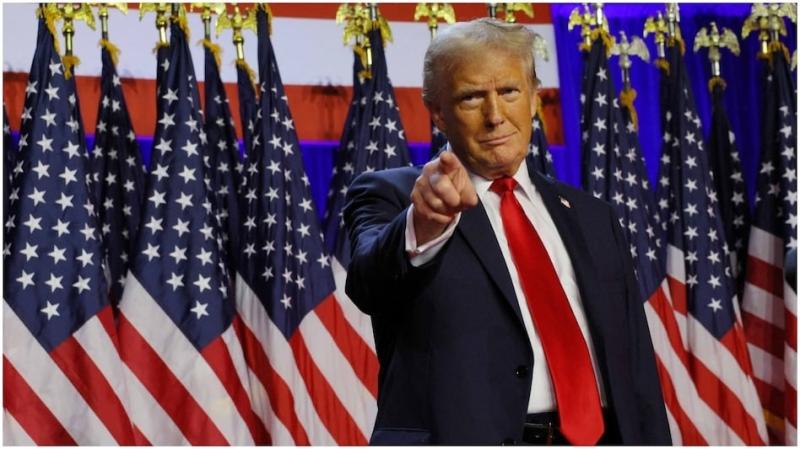
- galaxy
- 07 Nov 2024 01:37 AM
- Trump renewable energy, solar energy US, Trump EV policy, fossil fuel energy
Donald Trump’s recent vow to stop renewable energy projects, particularly offshore wind farms, on the first day of his potential presidency has raised alarm bells across the clean energy sector. In a statement that shocked industry leaders, Trump promised to “make sure that ends on day one,” referring to the offshore wind farms that are seen as a key component of the Biden administration’s green energy agenda. The pledge sent ripple effects through the stock market, with shares in major renewable energy companies like Orsted falling 14%, Vestas down 11%, and Nordex dropping by 7.5%, according to a Reuters report.
Trump’s stance on renewable energy is not new. During his 2016 campaign, he famously criticized solar power for needing large swaths of land, likening the land requirements to taking up “deserts” for large-scale projects. This is in contrast to the actual land requirements for most utility-scale solar operations, which typically occupy less than 600,000 acres.
Should Trump follow through on his pledge, it could have profound implications for the renewable energy sector. One of his first moves could be to cut or eliminate tax credits for renewable energy projects, particularly for wind and solar power. These tax incentives, such as the Investment Tax Credit (ITC) and the Production Tax Credit (PTC), have been critical to the rapid growth of the renewable energy sector in the United States. Without these supports, projects could face higher costs and reduced viability, potentially stalling the growth of clean energy.
Additionally, Trump has signaled that his administration could roll back many of the environmental regulations put in place by the Biden administration. This includes easing restrictions on fossil fuel industries, such as oil and natural gas production, and making it easier for these companies to operate on public lands and offshore areas.
Electric Vehicle Policy Shift: Trump’s energy policy is also shifting in the realm of electric vehicles (EVs). Despite previously calling electric cars a “hoax,” Trump has recently changed his stance, thanks in part to an endorsement from Elon Musk, the CEO of Tesla and SpaceX. While Trump still maintains that electric vehicles are suitable for “a small slice” of the population, he has softened his rhetoric and acknowledged that he is now “for electric cars” due to Musk’s support. His new position reflects a political calculation, as Musk’s backing could be crucial in securing support from the influential tech and business sectors.
However, Trump’s sudden shift on EVs has not fully quelled concerns within the industry. His earlier statements, such as wishing that EV supporters “rot in hell,” suggest that his ultimate policy goals for the EV market could still be unpredictable. A Trump presidency could potentially focus on reducing the electric vehicle mandate and cutting incentives for EV manufacturers, slowing the transition away from fossil fuel-powered vehicles.
Impact on Solar and Renewable Energy Stocks: The biggest impact of Trump's energy policy would likely be felt in the solar sector, especially after the Inflation Reduction Act (IRA), passed under President Biden, provided substantial tax incentives for clean energy projects. The IRA, which has been instrumental in driving solar energy growth, could face significant challenges under a Trump administration. Investors in renewable energy stocks are already nervous, with many fearing that a Trump presidency could dismantle the policy frameworks that have led to rapid expansion in solar and wind energy.
Fossil Fuel Revival? In contrast to his stance on renewable energy, Trump’s administration would likely emphasize a resurgence in fossil fuel projects. His previous administration supported increased drilling for oil and gas, and Trump has long advocated for the American energy independence narrative, which typically aligns with expanding fossil fuel production. If the renewable energy tax credits are rolled back and environmental regulations are relaxed, we could see a resurgence in fossil fuel projects like coal mining and oil drilling, which would slow the transition to a greener energy grid.
Conclusion: The future of renewable energy in the United States hinges on the outcome of the 2024 election and the direction Trump may take in his second term. His promise to halt offshore wind farms and reverse Biden-era green energy initiatives has already caused volatility in renewable energy markets. If he follows through on his pledge, it could slow the growth of the clean energy sector, reduce job creation in green industries, and hinder efforts to address climate change. On the other hand, his evolving stance on electric vehicles, especially with Musk’s backing, shows that the energy landscape under Trump could evolve in unpredictable ways.






























